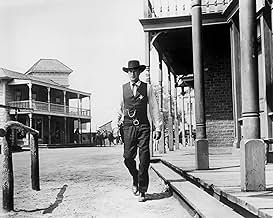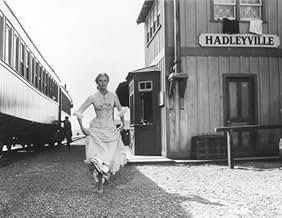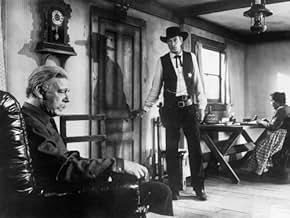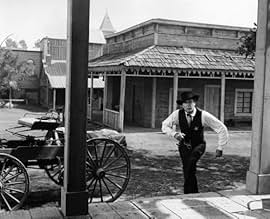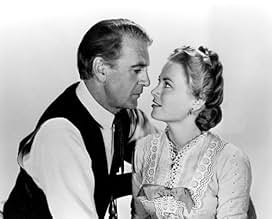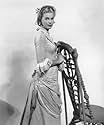Apesar dos desentendimentos com sua namorada e os habitantes da cidade, um marechal deve enfrentar uma gangue quando seu líder chegar no trem do meio-dia.Apesar dos desentendimentos com sua namorada e os habitantes da cidade, um marechal deve enfrentar uma gangue quando seu líder chegar no trem do meio-dia.Apesar dos desentendimentos com sua namorada e os habitantes da cidade, um marechal deve enfrentar uma gangue quando seu líder chegar no trem do meio-dia.
- Direção
- Roteiristas
- Artistas
- Ganhou 4 Oscars
- 18 vitórias e 12 indicações no total
Lon Chaney Jr.
- Martin Howe
- (as Lon Chaney)
Harry Morgan
- Sam Fuller
- (as Henry Morgan)
Robert J. Wilke
- Jim Pierce
- (as Robert Wilke)
Ernest Baldwin
- Townsman
- (não creditado)
Benjie Bancroft
- Church Member
- (não creditado)
- Direção
- Roteiristas
- Elenco e equipe completos
- Produção, bilheteria e muito mais no IMDbPro
Avaliações em destaque
The sombre ballad, the beleaguered marshall, the cold wife who deserts her man within an hour of marrying him ... "High Noon" is part of everyone's consciousness.
Will Kane is the veteran lawman of Hadleyville, a small Kansas town that used to be the playground of bad men, notorious among them one Frank Miller. "This is just a dirty little village in the middle of nowhere," but Kane cleaned it up. Five years ago he had Frank Miller committed to a distant federal court on a murder charge. Today, as Kane weds his quaker bride, news arrives that Miller is free and heading for Hadleyville. His henchmen gather at the depot, and it becomes clear that Frank will arrive on the midday train, looking to settle scores with the marshall who arrested him. Should Kane leave town with his bride, thus avoiding trouble for himself and for Hadleyville? Or should he stay and face the Miller gang? Will the citizens rally round their marshall?
John Wayne famously criticised the film for being 'unAmerican', in that (in his view) a frontier community would not desert its lawman so abjectly. Implicit in Wayne's malediction is the notion that mainstream movies should promote wholesome patriotic values - a notion that led in Wayne's case to the debacle of "The Green Berets". Zinneman's acclaimed film probes the ugly side of human nature, "sifting out the hearts of men".
Zinneman and Director of Photography Floyd Crosby devoted a lot of care to the look of the film, effort that paid off handsomely. From our first view of Lee Van Cleef as an ominous shadow on the horizon to the climactic cuts which seem to accelerate the arrival of the fateful train, this is a movie which speaks through images. The arid, flat expanses of Kansas mirror the impassive sky, and the town's rickety structures seem puny against the bleak magnificence of nature. Human wishes are vain in the face of Fate. Rail tracks extend with cruel exactitude into the distance, converging in perspective upon the vanishing point, the symbolic spot whence Frank Miller will materialise. Lurking in the depot's shade, the dark presence which is the Miller Gang bristles with malice.
Zinneman is not afraid of extreme close-ups, which he uses to reinforce moments of emotional power (Kane realising that he has no support, Helen refusing to beg). He shoots Kane predominantly from below waist height, stressing his tall, erect stance as a symbol of moral authority. Compositions are tight and attractive throughout.
Gary Cooper was fifty-one years old and quite ill when "High Noon" was shot. He is, in truth, too old for the part. Gregory Peck had turned it down, and it is fascinating to imagine Peck as Kane. There is no rapport whatsoever between Cooper and Grace Kelly, and they make unconvincing newly-weds. "I won't be there when it's over," says the blushing bride, and though the script tries valiantly to give Amy a motivation (she became a quaker after seeing her menfolk gunned down), the abiding impression is of Kelly's prissy coldness.
"High Noon" is, for an action western, surprisingly strong on character. The judge (Otto Kruger) is clear-headed about running away from the Millers, and argues his position powerfully, yet his authority is punctured by his actions as he speaks - lowering the Old Glory, and concealing the scales of justice. Lloyd Bridges is excellent as Harvey, the deputy whose moral vision is clouded by lust for Helen and immature resentment of Kane. Katy Jurado never looked lovelier than here, playing the fallen woman Helen Ramirez who loved and lost Kane - and loves him still. A young Harry Morgan is Sam Fuller, the self-important coward who cannot face Kane. Marshall Howe (Lon Chaney Jr.) is the retired lawman who is now embittered and counsels Kane against throwing his life away for the sake of these undeserving citizens - "They just don't care!" In a cameo of pivotal importance that must have been great fun to play, Howland Chamberlain is the bitchy hotel desk clerk who hits Amy with a few home truths. James Millican is Herb, the dependable deputy who vacillates when the chips are down, and Jack Elam makes a fleeting appearance as the town drunk who sleeps through the entire drama.
One interesting plot development is the strange alliance which forms between Kane's two women. They meet in Helen's hotel room and decide to leave town together. Significantly, as they ride past Kane in the buggy, it is Helen who looks back, not Amy.
It has been suggested that "High Noon" obeys Aristotle's three unities, especially that of time, the depicted events being capable of fitting into the film's ninety-minute span. Clocks are everywhere in Hadleyville, and the passing of the minutes is constantly emphasised. My only observation is, it remains ten minutes to twelve for an unconscionably long time.
"The day cometh that shall burn like an oven," we are informed, and I for one found the film's climax rather disappointing after the intense build-up. "It's our problem because this is our town," declares a local worthy, but neither he nor anyone does anything about it. Zinneman's great crane shot, about halfway through the film, speaks more eloquently than the hollow words, zooming back to show a silent, friendless street, and one upright man, utterly alone.
Will Kane is the veteran lawman of Hadleyville, a small Kansas town that used to be the playground of bad men, notorious among them one Frank Miller. "This is just a dirty little village in the middle of nowhere," but Kane cleaned it up. Five years ago he had Frank Miller committed to a distant federal court on a murder charge. Today, as Kane weds his quaker bride, news arrives that Miller is free and heading for Hadleyville. His henchmen gather at the depot, and it becomes clear that Frank will arrive on the midday train, looking to settle scores with the marshall who arrested him. Should Kane leave town with his bride, thus avoiding trouble for himself and for Hadleyville? Or should he stay and face the Miller gang? Will the citizens rally round their marshall?
John Wayne famously criticised the film for being 'unAmerican', in that (in his view) a frontier community would not desert its lawman so abjectly. Implicit in Wayne's malediction is the notion that mainstream movies should promote wholesome patriotic values - a notion that led in Wayne's case to the debacle of "The Green Berets". Zinneman's acclaimed film probes the ugly side of human nature, "sifting out the hearts of men".
Zinneman and Director of Photography Floyd Crosby devoted a lot of care to the look of the film, effort that paid off handsomely. From our first view of Lee Van Cleef as an ominous shadow on the horizon to the climactic cuts which seem to accelerate the arrival of the fateful train, this is a movie which speaks through images. The arid, flat expanses of Kansas mirror the impassive sky, and the town's rickety structures seem puny against the bleak magnificence of nature. Human wishes are vain in the face of Fate. Rail tracks extend with cruel exactitude into the distance, converging in perspective upon the vanishing point, the symbolic spot whence Frank Miller will materialise. Lurking in the depot's shade, the dark presence which is the Miller Gang bristles with malice.
Zinneman is not afraid of extreme close-ups, which he uses to reinforce moments of emotional power (Kane realising that he has no support, Helen refusing to beg). He shoots Kane predominantly from below waist height, stressing his tall, erect stance as a symbol of moral authority. Compositions are tight and attractive throughout.
Gary Cooper was fifty-one years old and quite ill when "High Noon" was shot. He is, in truth, too old for the part. Gregory Peck had turned it down, and it is fascinating to imagine Peck as Kane. There is no rapport whatsoever between Cooper and Grace Kelly, and they make unconvincing newly-weds. "I won't be there when it's over," says the blushing bride, and though the script tries valiantly to give Amy a motivation (she became a quaker after seeing her menfolk gunned down), the abiding impression is of Kelly's prissy coldness.
"High Noon" is, for an action western, surprisingly strong on character. The judge (Otto Kruger) is clear-headed about running away from the Millers, and argues his position powerfully, yet his authority is punctured by his actions as he speaks - lowering the Old Glory, and concealing the scales of justice. Lloyd Bridges is excellent as Harvey, the deputy whose moral vision is clouded by lust for Helen and immature resentment of Kane. Katy Jurado never looked lovelier than here, playing the fallen woman Helen Ramirez who loved and lost Kane - and loves him still. A young Harry Morgan is Sam Fuller, the self-important coward who cannot face Kane. Marshall Howe (Lon Chaney Jr.) is the retired lawman who is now embittered and counsels Kane against throwing his life away for the sake of these undeserving citizens - "They just don't care!" In a cameo of pivotal importance that must have been great fun to play, Howland Chamberlain is the bitchy hotel desk clerk who hits Amy with a few home truths. James Millican is Herb, the dependable deputy who vacillates when the chips are down, and Jack Elam makes a fleeting appearance as the town drunk who sleeps through the entire drama.
One interesting plot development is the strange alliance which forms between Kane's two women. They meet in Helen's hotel room and decide to leave town together. Significantly, as they ride past Kane in the buggy, it is Helen who looks back, not Amy.
It has been suggested that "High Noon" obeys Aristotle's three unities, especially that of time, the depicted events being capable of fitting into the film's ninety-minute span. Clocks are everywhere in Hadleyville, and the passing of the minutes is constantly emphasised. My only observation is, it remains ten minutes to twelve for an unconscionably long time.
"The day cometh that shall burn like an oven," we are informed, and I for one found the film's climax rather disappointing after the intense build-up. "It's our problem because this is our town," declares a local worthy, but neither he nor anyone does anything about it. Zinneman's great crane shot, about halfway through the film, speaks more eloquently than the hollow words, zooming back to show a silent, friendless street, and one upright man, utterly alone.
...a quote from Men in Black that applies here if it ever applied anywhere.
Gary Cooper plays marshal Will Kaine, who turns in his star immediately after he marries Amy, a Quaker girl (Grace Kelly). Upsetting the celebration is the news that killer Frank Miller is due on the noon train and his first order of business is to kill Kaine, a man who Kaine helped send to prison five years ago and swore blood vengeance at the time. The three members of his gang are waiting at the depot. Miller escaped hanging, got a long sentence, and some knuckleheads on the parole board have turned him loose. At first Kaine is with the popular sentiment - Run!. But then he realizes that Miller will lay waste to the town if he isn't there - the new marshal isn't due in until the next day - plus Miller will hunt him down wherever he is - Kaine will always be looking over his shoulder.
He goes around looking for deputies to help him make his stand. Oh, everybody talks about what a good job Kaine did, but nobody stands up for him. They have all kinds of excuses. That a shootout will cause investors from the east and north to think their town is just another shoot em up town, that if Will isn't there Miller will just leave etc. In the end the result is NOBODY stood by him in his hour of need, in spite of the fact that many in the town owed their lives and fortunes to Kaine cleaning up the town.
The best device in this movie - added after a preview called the film dull - is the constant showing of the clock, ticking away the precious minutes Kaine has. And he is a human hero - because you can tell dying is on his mind, running is on his mind, but in the end he stays to face his enemies. The scene towards the end, with him standing in the middle of a dusty abandoned main street as the camera pulls back just to show how alone Kaine is in this battle is iconic.
Where is his wife you might ask? With a ticket in hand to get on the next train out. At least Grace Kelly's character has a reason for her pacifism - her newly found Quaker faith. What she fails to realize is that unless you are willing to be a slave you have to be strong enough that you can afford pacifism.
There are some great performances here. There is Lon Chaney as the old sheriff who Will goes to for help. The old sheriff has the best excuse of all - he is just too old for this. Will would be looking after him instead of himself. Then there is Lloyd Bridges as one of the most unlikeable characters in film history. He's Kane's ex-deputy Harvey Pell and he is a weasel without the cuteness factor. He is tired of living in Kaine's shadow, just a little jealous that Kaine had Harvey's girl before he had her, very resentful that Kaine would not recommend him to be the new marshal. But here is his chance - if Kaine runs, Kaine is no better than he is. That is why he beats Will up trying to put him on a horse towards the end of the film. He doesn't want Will to live, he wants him to run, to somehow prove he is a coward.
And you have to love the townspeople thinking that this will just "all go away" if everybody hides. The first act of the foursome of gunslingers when they hit town is not to kill Kaine, but to smash a store window and take a woman's bonnet that one of the killers fancies - an act of theft. They'll be stealing more than stuff by nightfall if nobody stops them.
Highly recommended.
Gary Cooper plays marshal Will Kaine, who turns in his star immediately after he marries Amy, a Quaker girl (Grace Kelly). Upsetting the celebration is the news that killer Frank Miller is due on the noon train and his first order of business is to kill Kaine, a man who Kaine helped send to prison five years ago and swore blood vengeance at the time. The three members of his gang are waiting at the depot. Miller escaped hanging, got a long sentence, and some knuckleheads on the parole board have turned him loose. At first Kaine is with the popular sentiment - Run!. But then he realizes that Miller will lay waste to the town if he isn't there - the new marshal isn't due in until the next day - plus Miller will hunt him down wherever he is - Kaine will always be looking over his shoulder.
He goes around looking for deputies to help him make his stand. Oh, everybody talks about what a good job Kaine did, but nobody stands up for him. They have all kinds of excuses. That a shootout will cause investors from the east and north to think their town is just another shoot em up town, that if Will isn't there Miller will just leave etc. In the end the result is NOBODY stood by him in his hour of need, in spite of the fact that many in the town owed their lives and fortunes to Kaine cleaning up the town.
The best device in this movie - added after a preview called the film dull - is the constant showing of the clock, ticking away the precious minutes Kaine has. And he is a human hero - because you can tell dying is on his mind, running is on his mind, but in the end he stays to face his enemies. The scene towards the end, with him standing in the middle of a dusty abandoned main street as the camera pulls back just to show how alone Kaine is in this battle is iconic.
Where is his wife you might ask? With a ticket in hand to get on the next train out. At least Grace Kelly's character has a reason for her pacifism - her newly found Quaker faith. What she fails to realize is that unless you are willing to be a slave you have to be strong enough that you can afford pacifism.
There are some great performances here. There is Lon Chaney as the old sheriff who Will goes to for help. The old sheriff has the best excuse of all - he is just too old for this. Will would be looking after him instead of himself. Then there is Lloyd Bridges as one of the most unlikeable characters in film history. He's Kane's ex-deputy Harvey Pell and he is a weasel without the cuteness factor. He is tired of living in Kaine's shadow, just a little jealous that Kaine had Harvey's girl before he had her, very resentful that Kaine would not recommend him to be the new marshal. But here is his chance - if Kaine runs, Kaine is no better than he is. That is why he beats Will up trying to put him on a horse towards the end of the film. He doesn't want Will to live, he wants him to run, to somehow prove he is a coward.
And you have to love the townspeople thinking that this will just "all go away" if everybody hides. The first act of the foursome of gunslingers when they hit town is not to kill Kaine, but to smash a store window and take a woman's bonnet that one of the killers fancies - an act of theft. They'll be stealing more than stuff by nightfall if nobody stops them.
Highly recommended.
On the day of his wedding with Amy (Grace Kelly) and simultaneous retirement of the position of Marshal, Will Kane (Gary Cooper) receives a telegram advising that the criminal Frank Miller (Ian MacDonald) had been released from the prison. Now he is coming to the town in the noon train to kill Kane, as he promised in the judgment. Kane arrested Frank five years ago and he was sent to North to be hanged. However he was sentenced to life and for some unexplained reason, Frank was pardoned and released. Three other gunmen are in the station waiting for Frank. Having less one hour and half to organize his defense, Kane tries to organize a posse but sees every citizen turns back to him, in a cowardly way and he stands alone against the killers.
"High Noon" is a low-budget western with a tense and suspenseful storyline. The tension is built in real time and Gary Cooper has an outstanding performance in the role of a Marshal moved by his duty to protect the town that does not deserve him. It is sad to see his former friends finding excuses to turn down his request for helping. The performances are top notch and the viewer gets tense while the clocks show the fatidic noon coming. Grace Kelly is astonishing beautiful and finds redemption in the conclusion when she saves Kane. The final scene when Kane drops his badge on the dirty floor is memorable. "High Noon" is certainly one of the most credible westerns of the cinema history and might be one of the best. My vote is ten.
Title (Brazil): 'Matar ou Morrer' ('To Kill or To Die')
"High Noon" is a low-budget western with a tense and suspenseful storyline. The tension is built in real time and Gary Cooper has an outstanding performance in the role of a Marshal moved by his duty to protect the town that does not deserve him. It is sad to see his former friends finding excuses to turn down his request for helping. The performances are top notch and the viewer gets tense while the clocks show the fatidic noon coming. Grace Kelly is astonishing beautiful and finds redemption in the conclusion when she saves Kane. The final scene when Kane drops his badge on the dirty floor is memorable. "High Noon" is certainly one of the most credible westerns of the cinema history and might be one of the best. My vote is ten.
Title (Brazil): 'Matar ou Morrer' ('To Kill or To Die')
High Noon is for me one of the two finest Westerns ever made (the other is Shane). It is an elemental commentary on the best and worst of America, the best and worst of mankind. It is Greek tragedy and Shakespeare brought to the Old West in a grandly simple form. Gary Cooper is superb and the supporting cast is outstanding as well (although I wish Grace Kelley would have spoken without the artificial sounding school-girl accent, something which marred so many of her otherwise fine performances). I do not read into the film a commentary on events of the 1950s, specifically the ongoing investigations by Congress of left-wing activities. High Noon transcends such specifics as this. I know John Wayne called the film un-American but I must disagree. I have great respect for the Duke but think he got this one wrong. Weak, timid people are everywhere and the strong are often few and far between. Goodness and right often prevail because a small minority insure that they do. All benefit from the courage of the lonely hero whether they realize it or not. Hign Noon is a testimony to this truth.
Will Kane (Gary Cooper), the longtime marshal of Hadleyville, New Mexico Territory, has just married pacifist Quaker Amy (Grace Kelly) and turned in his badge. Suddenly, the town learns that Frank Miller (Ian MacDonald) -- a criminal Kane brought to justice -- is due to arrive on the noon train. The townspeople refuse to back the sheriff up.
Apparently, this film was intended as an allegory in Hollywood for the failure of Hollywood people to stand up to the House Un-American Activities Committee during the Sen. Joseph McCarthy Red-baiting era. John Wayne actually called the film "un-American", and was still trashing it twenty years later, which is pretty much the highest honor you can receive.
It must have also bothered Howard Hawks, because the "chicken" sheriff led Hawks to make "Rio Bravo", which, surprise, had John Wayne. As an interesting side note, Cooper was conservative, too, but I guess not as much as Wayne or at least not as emotional about it.
The film is called "a western for people who don't like westerns". I can see the point on that, but I do not know how accurate it is. I liked it, and I do not normally like westerns, so I probably should not argue. But I think some westerns are enjoyable by non-western fans, such as "Unforgiven". So "High Noon" is certainly not alone.
I love that the film is in "real time", that its running time is the same length as the actual plot. The only way this could have been better would be to do it with one, continuous shot. However, I suspect they did not have the technology for this, and it would ruin the cinematography. (Hitchkock basically did this with "Rope" with some key edits, but it is much easier when the film happens in a single room.)
Oh, and there is Lloyd Bridges, so young here...
Apparently, this film was intended as an allegory in Hollywood for the failure of Hollywood people to stand up to the House Un-American Activities Committee during the Sen. Joseph McCarthy Red-baiting era. John Wayne actually called the film "un-American", and was still trashing it twenty years later, which is pretty much the highest honor you can receive.
It must have also bothered Howard Hawks, because the "chicken" sheriff led Hawks to make "Rio Bravo", which, surprise, had John Wayne. As an interesting side note, Cooper was conservative, too, but I guess not as much as Wayne or at least not as emotional about it.
The film is called "a western for people who don't like westerns". I can see the point on that, but I do not know how accurate it is. I liked it, and I do not normally like westerns, so I probably should not argue. But I think some westerns are enjoyable by non-western fans, such as "Unforgiven". So "High Noon" is certainly not alone.
I love that the film is in "real time", that its running time is the same length as the actual plot. The only way this could have been better would be to do it with one, continuous shot. However, I suspect they did not have the technology for this, and it would ruin the cinematography. (Hitchkock basically did this with "Rope" with some key edits, but it is much easier when the film happens in a single room.)
Oh, and there is Lloyd Bridges, so young here...
Você sabia?
- CuriosidadesIn 1951, after 25 years in show business, Gary Cooper's professional reputation was in decline, and he was dropped from the "Motion Picture Herald's" list of the top-ten box-office performers. In the following year, he made a big comeback, at the age of 51, with this film.
- Erros de gravaçãoIn a number of scenes there are Pabst Brewing signs seen on the inside and outside walls of the saloon. Although Pabst did brew in 1848, it did so under the name Best and Company and did not change to Pabst until 1889; the 37-star flag suggests the setting dates are between 1867-77.
- Citações
Helen Ramírez: You're a good-looking boy: you've big, broad shoulders. But he's a man. And it takes more than big, broad shoulders to make a man.
- ConexõesEdited into Darkness at High Noon: The Carl Foreman Documents (2002)
- Trilhas sonorasHigh Noon (Do Not Forsake Me, Oh My Darlin')
Music by Dimitri Tiomkin
Lyrics by Ned Washington
Performed by Tex Ritter
[Played over the opening title card and credits; excerpts played throughout the movie]
Principais escolhas
Faça login para avaliar e ver a lista de recomendações personalizadas
Detalhes
- Data de lançamento
- País de origem
- Idiomas
- Também conhecido como
- A la hora señalada
- Locações de filme
- Empresa de produção
- Consulte mais créditos da empresa na IMDbPro
Bilheteria
- Orçamento
- US$ 730.000 (estimativa)
- Faturamento bruto mundial
- US$ 217
- Tempo de duração1 hora 25 minutos
- Cor
- Proporção
- 1.37 : 1
Contribua para esta página
Sugerir uma alteração ou adicionar conteúdo ausente





